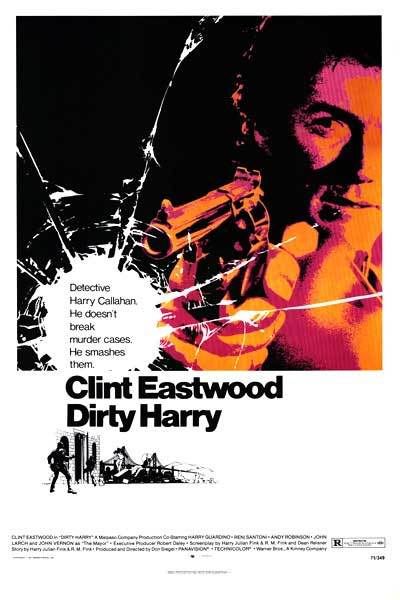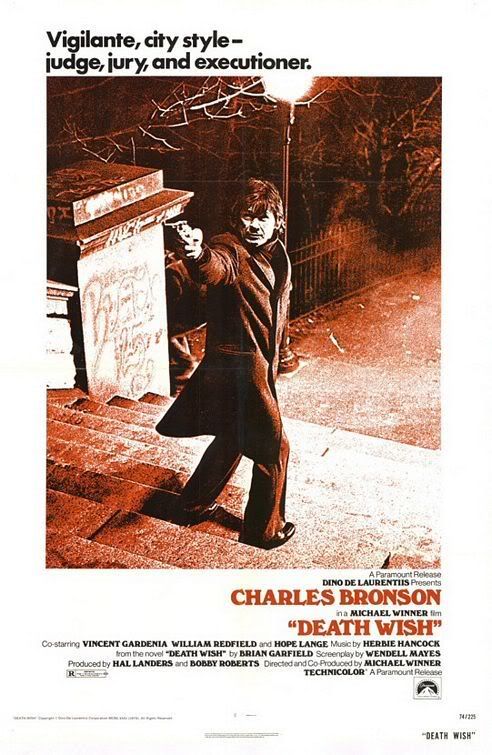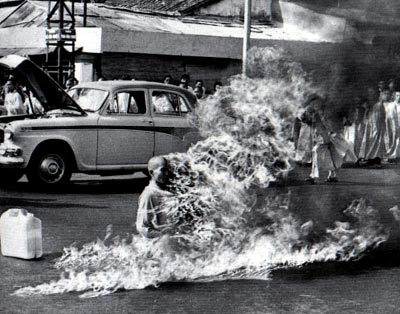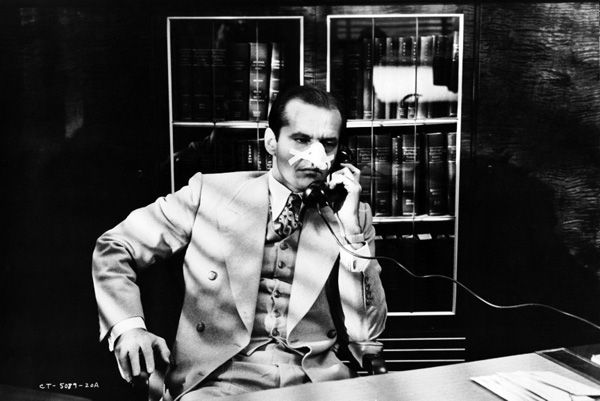 The film noir genre is probably the most substantial genre in film history. It's able to be re-written, re-told, re-imagined, and re-made over and over and it has a history of success. All you need are characters that you truly care about in joining this journey of intrigue, deception, and danger. A noir can be created out of just about any kind of subject matter. No matter how frivolous and trivial the object of the story may be, a noir can be successful with the right writer. How can you tell if you have a good noir on your hands? Well we've already established the need for a great central character, but why not two characters? Who said it can only involve one person? The character should also be someone you're truly interested in. Do you want to know why the detective in the dilapidated office at the end of the block is some how the only person right for the job? Do you want to know why the character is alone, depressed, haggard? Maybe you wanna know why he/she is so good at their job? A great character introduction in the noir department is important, after all this is the person you are following for the duration of the film and is basically your tour guide through the environments you will be entering. The next important puzzle piece in a film noir is a question, that is to say; Who did it? Why are they doing it? Who's behind this? Being a murder, a criminal case, a charge of conspiracy, and even cases of real estate fraud can be a subject that upon first listen can seem boring, but it's the way the web is woven that truly gives the story it's luster and beauty. You know the noir is a failure if you already know the conclusion 15 minutes into the film. A truly good noir unravels with the utmost precision in small layers at a time to keep the viewer guessing and anticipating what will happen next. To make a good noir film, you must have a filmmaker that understands a good noir film, after all these films were the back bone of cinema in the 40's, 50's, and 60's...so why should the 70's and even the films of today be any different? Alfred Hitchcock set the bar when it comes to making a good and successful noir, some people understood it and some people didn't. What Hitchcock always did however, was eventually surprise you in it's conclusion and that's truly what makes a good noir. Films like Casablanca, The Maltese Falcon, Vertigo, and Third Man are all good examples of a noir that truly works it's impact and the magic unfolds before your very eyes in a contemporary setting. With that being said, for my next entry in the 70's cinema month on the frequencies blog; Noir in the 70's.
The film noir genre is probably the most substantial genre in film history. It's able to be re-written, re-told, re-imagined, and re-made over and over and it has a history of success. All you need are characters that you truly care about in joining this journey of intrigue, deception, and danger. A noir can be created out of just about any kind of subject matter. No matter how frivolous and trivial the object of the story may be, a noir can be successful with the right writer. How can you tell if you have a good noir on your hands? Well we've already established the need for a great central character, but why not two characters? Who said it can only involve one person? The character should also be someone you're truly interested in. Do you want to know why the detective in the dilapidated office at the end of the block is some how the only person right for the job? Do you want to know why the character is alone, depressed, haggard? Maybe you wanna know why he/she is so good at their job? A great character introduction in the noir department is important, after all this is the person you are following for the duration of the film and is basically your tour guide through the environments you will be entering. The next important puzzle piece in a film noir is a question, that is to say; Who did it? Why are they doing it? Who's behind this? Being a murder, a criminal case, a charge of conspiracy, and even cases of real estate fraud can be a subject that upon first listen can seem boring, but it's the way the web is woven that truly gives the story it's luster and beauty. You know the noir is a failure if you already know the conclusion 15 minutes into the film. A truly good noir unravels with the utmost precision in small layers at a time to keep the viewer guessing and anticipating what will happen next. To make a good noir film, you must have a filmmaker that understands a good noir film, after all these films were the back bone of cinema in the 40's, 50's, and 60's...so why should the 70's and even the films of today be any different? Alfred Hitchcock set the bar when it comes to making a good and successful noir, some people understood it and some people didn't. What Hitchcock always did however, was eventually surprise you in it's conclusion and that's truly what makes a good noir. Films like Casablanca, The Maltese Falcon, Vertigo, and Third Man are all good examples of a noir that truly works it's impact and the magic unfolds before your very eyes in a contemporary setting. With that being said, for my next entry in the 70's cinema month on the frequencies blog; Noir in the 70's.CHINATOWN - ROMAN POLANSKI - 1974

Robert Towne wrote this masterful screenplay about a private eye named Jake Gittes uncovering more than he expected in what is considered to be one of the greatest noir film entries of all time. Our story centers around Gittes (Jack Nicholson) who is hired by a woman named Mrs. Mulwray, who suspects her husband of cheating. Mr. Mulwray is one of the city's most powerful; involved in the development of the city's water management supply. Gittes completes what he is hired to do, however spying on Mr. Mulwray only opens a pandora's box of municipal corruption, deceit, and murder. Set in the 1930's era of Los Angeles, Chinatown was the brainchild of Robert Towne after declining to work on F Scott's Fitzgerald's The Great Gatsby. The screenplay was originally 180 pages long; which in reality would mean the film would've been quite lengthy since a page is supposed to equal a minute's worth of screen time. The abridged script eventually made it's way to the lap of director Roman Polanski who was reluctant to return to the United States to shoot again since his wife was murdered by the Manson Family. Polanski finally agrees and Jack Nicholson takes the role of Jake Gittes and noir history is made. Chinatown, aside from most film noirs, was exciting and different at the time because of one major person involved. Roman Polanski created this film in such a manner that makes the audience directly involved in Gittes journey of solving the case and that's what makes the film so special. Polanski shot and paced the film in a manner where the audience was learning of all Gittes clues and leads at the exact same time he is; to keep the audience guessing. Eventually Chinatown became a huge success and was eventually followed up in 1990 with Nicholson starring and directing. The Two Jakes wasn't quite as impressive as Chinatown and shot the possibility of what I understand were Towne's intentions of turning the Gittes mysteries into a trilogy. In 1975, Chinatown swept the oscars in nearly every category from Best Actor, Actress, Director, Picture, Original Screenplay, Cinematography, Costume Design, etc....only to take home one that evening for Best Original Screenplay for Robert Towne. A staple in hollywood history, mystery, and noir...Chinatown with it's complex story and characters juxtaposed to it's simple and nearly no effects laden execution, makes the film one that people now can even understand why it's reverred as one of the best noirs ever to be seen on the big screen.
THE CONVERSATION - FRANCAIS FORD COPPOLA - 1974
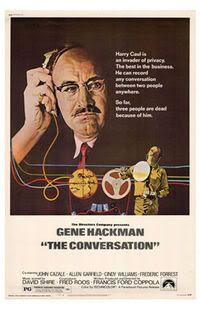
Paranoia and suspicion are the elephants in the room in most noir films, but not like in Coppola's 1974 classic The Conversation. Gene Hackman plays Harry Caul, an audio surveillance specialist hired to spy on the conversation of a couple in a crowded town square on suspicion of foul play to the person who originally hired Caul. Caul is a very strange character that somehow finds his way into our interests more so because of his actions and his secretive demeanor. Hackman delivers a performance that's one of the strongest of his career next to his portrayal of the hard boiled narcotics detective Popeye Doyle in the French Connection. Caul's reluctance of trusting anyone from his longtime partner; wonderfully played by John Cazale (The Godfather, Dog Day Afternoon) to his girlfriend; Teri Garr only adds to the question of "why?". As the film progresses, Harry Caul has a reason to believe that the audio tapes he's ordered to deliver are dangerous to the people he was surveilling. The persistence of "the director"'s assistant; played by Harrison Ford, in retrieving the tapes only raises his suspicion that something is definitely not safe. Francais Ford Coppola had originally written this film in the mid-60s when he was beginning his film career and always found it hard to get it to the screen. It was only after the success of the Godfather, was when he was able to make just about any film he wanted. Ultimately, the film went on to be nominated and well received by both the academy and audiences as well. The film's paranoid undertones and audio surveillance scenes were always compared to the similar situation that happened with President Nixon in the Watergate Scandal, which could've been a contributing factor to the film's success and intrigue. None the less, The Conversation is another entry in the extraordinary repertoire of 70's cinema, and is a different take on the noir genre entirely. The Conversation is in my personal favorites of the director's films and according to many people who've spoken with Coppola; it's one of his as well.
ALL THE PRESIDENT'S MEN - ALAN J. PAKULA - 1976

I've always said that when it came to the films of Dustin Hoffman, from the start of his career in the Graduate in the late 60's to 1980, everything he did was absolute gold. From Straw Dogs, Kramer vs. Kramer, Marathon Man, John and Mary, and Papillon his ability to do just about any character made him one of the most special actors this generation has come to know and love. All The President's Men is another entry in this man's illustrious career. All The President's Men is an adapted screenplay based on a novel by Bob Woodward and Carl Bernstein about their investigation of the Watergate Scandal while employed by the Washington Post. There isn't much to explain past what I've mentioned because this is a pillar in american history. June 19th, 1972, 5 men were arrested for breaking and entering into the Democratic National Committee headquarters in the Watergate complex. It was said that Nixon from the beginning was involved and news made it to the Washington Post where Woodward and Bernstein were working. The film follows their dedication and persistence to uncovering as much information as they possibly could with every possible wave ahead of them, professionally and personally. Woodward also includes in the book; which also becomes part of them film, close accounts with the person who brought the Watergate investigation to it's knees with a person named "Deep Throat". The film's fantastic and exciting journey for the search of any and all evidence of this break in is considered by many to be one of the most exciting noir films in history. A completely different take on the whole noir film genre as a whole since the detectives are reporters and what they are investigating is something that really happened. Robert Redford and Dustin Hoffman's chemistry is undeniable from the second they meet on screen together. The film eventually went to be nominated in nearly every category possible including Best Picture. Armed with a great behind the scenes crew and a wonderful supporting cast alongside Hoffman and Redford; which included Jason Robards, Martin Balsam, Hal Holbrook, and Ned Beatty. All The President's Men is an exciting look at the process of investigation and with no gunplay, action, car chases...proves that sometimes the pen can truly be mightier than the sword.

